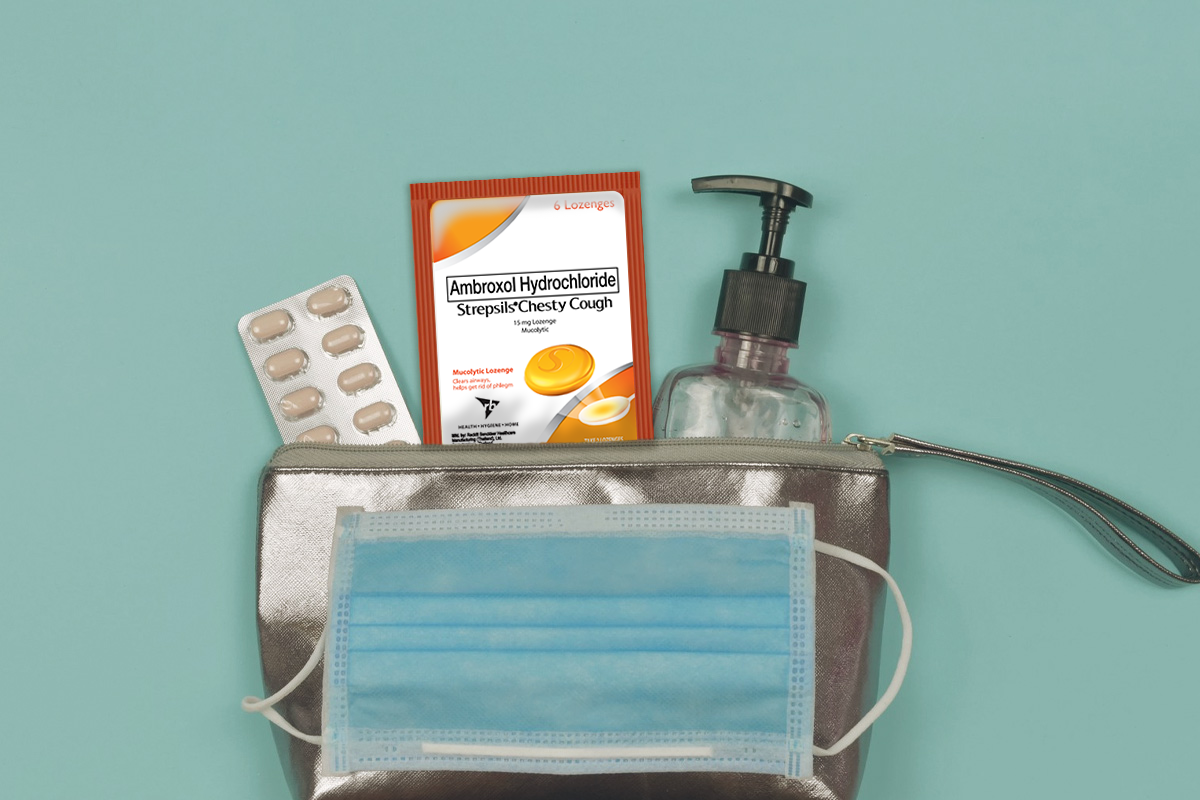When it comes to dealing with a cough with phlegm, it is not enough to just focus on its symptoms. It is important to also address any underlying conditions that may be causing it and try to actively reduce your risk through lifestyle changes.
You probably already know how disruptive a cough with phlegm can be to your day-to-day activities. But did you know it can also be a sign of more serious medical conditions? This is why it’s important to know not only how to treat it, but also what causes it so you can prevent it from happening in the first place.
Causes
Also known as a productive or chesty cough, a cough with phlegm commonly develops because of other medical conditions that trigger excess mucus production, which the body then tries to expel by coughing. Examples of which include:
- Respiratory infections such as pneumonia, bronchitis, the flu, or the common cold7
- Asthma, which can trigger excess mucus production due to the inflammation it causes to the body’s airways7
- Postnasal drip, a condition where the excess mucus drips into the back of the throat from the nasal passages7
- Chronic obstructive pulmonary disease, which leads to chronic inflammation in the body’s airways7
- Acid reflux or GERD where the backflow of stomach acid into the throat triggers excess mucus production as protection7
- Lung conditions such as bronchiectasis and tuberculosis7
| In addition to medical conditions, smoking is also known to cause coughing with phlegm1. It does this by causing irritation to the lungs and airways, which, in turn, triggers long-term excess mucus production and leads to a condition known as smoker’s cough. |
For more information on the causes, symptoms, and treatments for cough with phlegm and dry cough, please visit the Cough: Symptoms, Causes, and Treatment Options page.
How to Treat a Cough with Phlegm
An effective cough with phlegm treatment plan combines medication and lifestyle changes.
Medication

Taking an over-the-counter medicine for cough with phlegm is a good place to start when it comes to treating the condition. For cough with phlegm, you can take mbroxol Hydrochloride (Strepsils) Chesty Cough as an option. It is proven effective against symptoms of cough with phlegm2 thanks to its ability to:
- Help break down phlegm, making it easier to expel
- Trigger the production of a substance in the body designed to , protecting the body’s airways from irritation and infection
Need to stock up on Ambroxol Hydrochloride (Strepsils) Chesty Cough? Shop now at Reckitt Health and Beauty Store on Lazada and Reckitt Health Official on Shopee or find out more about our products.
| It is also important to take medication and get proper treatment for any underlying conditions that are causing your cough with phlegm. Consult your doctor for more information. |
Lifestyle Changes

In addition to taking medication, making the following lifestyle changes may help with your recovery:
- Staying hydrated — In addition to water, you can also drink ginger tea with a tablespoon of honey to alleviate the symptoms of your chesty cough. Ginger is known for its cough suppressing properties3 while honey acts as an antibacterial agent and provides soothing relief4.
- Quitting smoking — Limiting or totally stopping smoking plays a big role in helping beat chesty cough for good. By doing so, you are removing one of the most common coughing triggers from the equation, making it easier for your body to recover.
- Avoiding acidity triggers — If your cough with phlegm is due to acid reflux or GERD, then avoiding trigger foods, beverages, and activities6, should help alleviate your symptoms.
Prevention Tips
- Treatment and management of underlying conditions — By treating and properly managing the conditions that are causing your chesty cough, you are effectively addressing the source of the problem directly7.
- Staying healthy — Following the lifestyle changes we talked about in the previous section goes a long way in helping you keep the condition at bay7.
- Avoiding irritants — Make sure to also steer clear of dust, pollen, smoke, strong chemicals, and other irritants that could cause respiratory issues7.
- Getting vaccinated — Protecting yourself from conditions like pneumonia and the flu should also help reduce your risk of developing the condition7.
The Bottom Line: Treating a Cough with Phlegm Requires a Comprehensive Approach
When it comes to treating a chesty cough, it is not enough to just focus on the symptoms. You need to also address any underlying conditions that may be causing it and actively minimize your risk for it through lifestyle changes.
If your symptoms persist or worsen, please talk to a healthcare professional immediately.
References:
- Approaching chronic cough, available at https://www.ncbi.nlm.nih.gov/pmc/articles/PMC4759375/. Accessed on 16 October 2024.
- Ambroxol, available at https://go.drugbank.com/drugs/DB06742. Accessed on 17 October 2024.
- Active ingredients of ginger as potential candidates in the prevention and treatment of diseases via modulation of biological activities, available at https://pmc.ncbi.nlm.nih.gov/articles/PMC4106649/. Accessed on 17 October 2024.
- Mayo Clinic Minute: Can honey help with coughs?, available at https://newsnetwork.mayoclinic.org/discussion/mayo-clinic-minute-can-honey-help-with-coughs/. Accessed on 17 October 2024.
- Effects of Ginger and Its Constituents on Airway Smooth Muscle Relaxation and Calcium Regulation, available at https://www.ncbi.nlm.nih.gov/pmc/articles/PMC3604064/. Accessed on 17 October 2024.
- Acid Reflux & GERD, available at https://my.clevelandclinic.org/health/diseases/17019-acid-reflux-gerd. Accessed on 17 October 2024.
- Cough https://www.healthdirect.gov.au/cough . Accessed April 15, 2025
